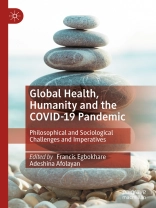This volume interrogates global health and especially the scourge of the COVID-19 pandemic, and the role that science has played in mitigating the human experiences of pandemics and health over the centuries. Science, and the scientific method, has always been at the forefront of the human attempt at undermining the virulent consequences of sicknesses and diseases. However, the scientific image of humans in the world is founded on the presumption of possessing the complete understanding about humans and their physiological and psychological frameworks. This volume challenges this scientific assumption. Global health denotes the complex and cumulative health profile of humanity that involves not only the framework of scientific researches and practices that investigates and seeks to improve the health of all people on the globe, but also the range of humanistic issues – economic, cultural, social, ideological – that constitute the sources of inequities and threat to the achievement of apositive global health profile. This volume balances the argument that diseases and pandemics are human problems that demand both scientific and humanistic interventions.
Tabla de materias
Chapter One Introduction: Humanity and Disease Discourse.- Chapter Two Toward a Fuller Understanding of the Enigma of Health.- Chapter Three Ubuntu and COVID-19: A Philosophical Reflection.- Chapter Four Limits of Science-based Approaches in Global Health: Socio-Cultural and Moral Lessons from Ebola and Covid-19.- Chapter Five The Vaccination Mandate Debate Revisited.- Part II: Critical Framing of the Pandemic in Africa.- Chapter Six An African Perspective on the Ethics and Politics of Foreign Medical Aid in a Pandemic.- Chapter Seven Disease Discourses, African Knowledge Systems, and COVID-19 in Senegal.- Chapter Eight
Ẹ
nul
ẹ
b
ọ: Ethical Imperative of Yorùbá Thought on Eating for Covid-19 Related Crises.- Chapter Nine Epidemiology and an Epistemic Evaluation of the Management of Covid-19 in Nigeria.- Chapter Ten Borders, Boundaries and Identities: Navigating the Barriers to Solidarity and Cohesion in a Pandemic.- Chapter Eleven Discourses of the Wandering
Almajiri Child as Representation of the (Post-) COVID Generation.- Chapter Twelve Quarantining the Holy Spirit: Africa and the Pentecostal Economy of COVID-19 Pandemic.- Chapter Thirteen On Pandemic Planning and the Front-line Workers in Nigeria.- Chapter Fourteen Dialogism and Polyphony in the Interpretations of COVID-19 Discourse in Zimbabwe.- Part III: Representing COVID-19.- Chapter Fifteen Cartooning COVID on Facebook.- Chapter Sixteen “It’s in Your hands”: Communicating a Pandemic to a Disengaged Public.- Chapter Seventeen Musical (Re)presentations of COVID-19 on Social Media among Young People in Nigeria.- Chapter Eighteen Covid-19, Food and Freedom to Worship: An Analytic Approach to Nigeria’s Religioscape.- Chapter Nineteen Covid-19 Risk Communication and Community Engagement on Social Media in Nigeria.- Chapter Twenty COVID-19 (Post)proverbials: Twisting the Word Against the Virus.
Sobre el autor
Francis Egbokhare is a Professor of Linguistics at the University of Ibadan, a public intellectual and a former president of the Nigerian Academy of Letters (NAL), Nigeria. His areas of specialization include ethics and citizenship; culture and development, grammar, phonology and sociolinguistics. In addition, he has published works on open and distance education and management of higher education. He is the co-editor (with R. P. Schaefer) of A Dictionary of Emai (2007), A Grammar of Emai (2016), and Class Marking in Emai (2019).
Adeshina Afolayan is a Professor of African Philosophy at the University of Ibadan, Nigeria. His areas of specialization include philosophy of politics, African cultural studies, and African philosophy. He is the author of Philosophy and National Development in Nigeria (2018), a co-editor of the Palgrave Handbook of African Philosophy (2017), Pentecostalism and Politics in Africa (2018), and Pathways to Alternative Epistemologies in Africa (2021), editor of Identities, Histories and Values in Nigeria (2021), and co-author of Fela Anikulapo-Kuti: Afrobeat, Rebellion and Philosophy (2022).












